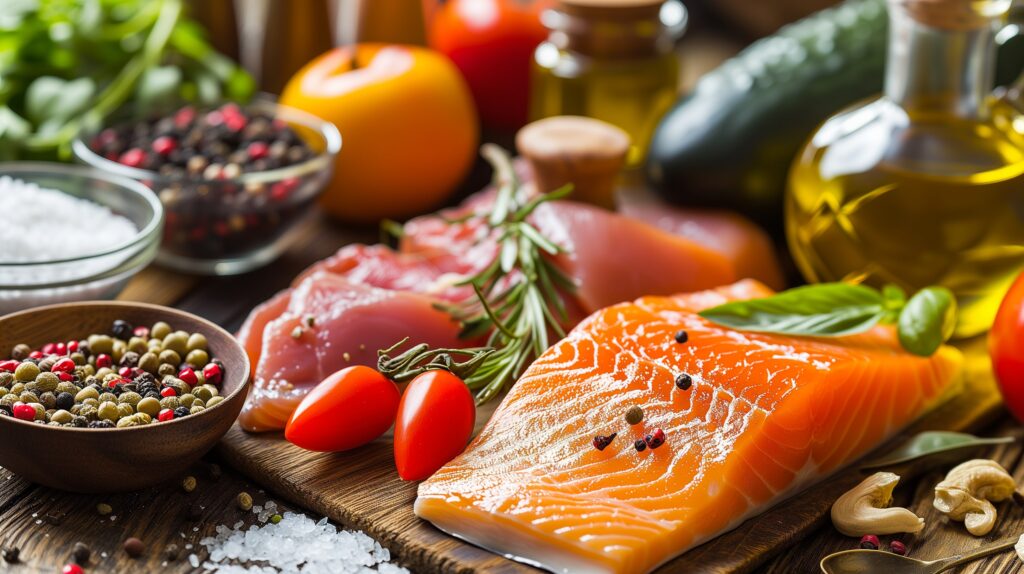Table of Contents
When it comes to heart health, the foods we choose can have a significant impact. Red meat, a staple in many diets, is often high in saturated fats which can contribute to elevated cholesterol levels and an increased risk of heart disease. Fortunately, there are plenty of leaner protein sources available. In this article, we’ll explore the benefits of trimming the fat from your diet by choosing lean proteins, heart-healthy alternatives to red meat, and the power of plant-based proteins. Plus, we’ll provide tips on how to incorporate these into your diet seamlessly, with the added support of tools like the My Heartlet app, which is designed to assist in maintaining a heart-healthy lifestyle.
Trim the Fat: Choose Lean Proteins
Incorporating lean proteins into your diet is a smart move for anyone looking to maintain a healthy heart. Lean proteins contain less saturated fat and cholesterol compared to their fattier counterparts, which is beneficial in managing blood lipid levels. The American Heart Association (AHA) recommends choosing lean meats, such as skinless poultry and fish, which are excellent sources of protein but contain less of the unhealthy fats that can lead to heart disease.
When selecting red meat, opt for cuts that are labeled as “loin” or “round,” as these usually have less fat. Furthermore, trimming visible fat from meat and choosing cooking methods like grilling, broiling, or baking over frying can help reduce your intake of saturated fat. For those looking to take it a step further, the ‘My Heartlet’ app provides guidance and recipes to help you make smarter protein choices for your heart’s health.
Tips for choosing lean proteins:
- Select white meat poultry and remove the skin before cooking.
- Choose fish rich in omega-3 fatty acids, such as salmon, trout, or mackerel.
- Look for beef or pork cuts with “loin” or “round” in the name.
- Trim visible fat from meats before cooking.
- Utilize cooking methods that don’t add extra fat, such as baking, grilling, or steaming.
Heart-Healthy Alternatives to Red Meat

If you’re looking to diversify your protein sources beyond lean meats, there are numerous heart-healthy alternatives to consider. Fish is a fantastic option, with organizations like the Mayo Clinic highlighting the importance of omega-3 fatty acids found in fatty fish for heart health. These essential fats can help reduce blood pressure and the risk of developing blood clots.
For those who prefer not to eat meat, or are looking to cut back, other alternatives include legumes like beans, lentils, and chickpeas, which are high in protein and fiber but low in fat. Eggs and low-fat dairy products can also be included as part of a heart-healthy diet. The ‘My Heartlet’ app can serve as a digital companion, offering recipes and tips for incorporating these protein-rich alternatives into your meals.
Some heart-healthy protein options include:
- Fatty fish such as salmon, mackerel, and sardines.
- Legumes like beans, lentils, and chickpeas.
- Low-fat or non-fat dairy products, such as milk, yogurt, and cheese.
- Nuts and seeds, in moderation, due to their high-calorie content.
Embrace Plants for Protein Power!
Moving away from animal-based proteins altogether, plant-based proteins offer a wealth of health benefits. A plant-based diet can be associated with lower levels of obesity, reduced risk of heart disease, and better control of blood pressure and cholesterol levels. According to the Harvard School of Public Health, plant-based diets are rich in fiber, vitamins, and minerals while being low in calories and saturated fats.
Some of the best sources of plant-based proteins include tofu, tempeh, and edamame, all of which are derived from soybeans and are complete proteins containing all nine essential amino acids. Quinoa and buckwheat are also complete proteins and provide an excellent base for a variety of dishes. The ‘My Heartlet’ app can inspire you with creative plant-based recipes that are both delicious and nutritious.
Top plant-based proteins to include in your diet:
- Soy products like tofu, tempeh, and edamame.
- Whole grains such as quinoa, buckwheat, and barley.
- Nuts and nut butters (in moderation).
- Seeds like chia, flaxseed, and hemp seeds.
Making the switch to leaner proteins and incorporating more plant-based options into your diet can have a profound effect on your heart health. By choosing options lower in saturated fat and richer in essential nutrients, you’re not only reducing your risk of heart disease but also embracing a lifestyle that can lead to overall improved health. Whether you’re grilling a piece of fish, tossing beans into a salad, or experimenting with tofu, the ‘My Heartlet’ app is there to support your journey with heart-healthy tips and recipes. Remember, taking care of your heart starts with what’s on your plate, so make every bite count for a healthier, happier you.
